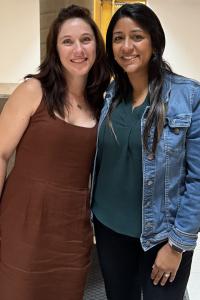 On July 10, 2024, microbiology graduate student Andrea Sánchez-Peña successfully defended her thesis entitled, "The role of Pseudomonas aeruginosa surface motility in interspecies interactions with Staphylococcus aureus”. She is pictured with her mentor Dominique Limoli, PhD.
On July 10, 2024, microbiology graduate student Andrea Sánchez-Peña successfully defended her thesis entitled, "The role of Pseudomonas aeruginosa surface motility in interspecies interactions with Staphylococcus aureus”. She is pictured with her mentor Dominique Limoli, PhD.
Research
The polymicrobial nature of many chronic infections makes their treatment and eradication challenging. Particularly, coisolation of Pseudomonas aeruginosa and Staphylococcus aureus from the airways of people with cystic fibrosis (CF) is common and associated with severe clinical outcomes. The complex interplay between these pathogens is not fully understood, highlighting the need for continued research of their interactions to improve the management of chronic infections.
Our lab has demonstrated that P. aeruginosa is attracted to S. aureus-secreted peptides called phenol soluble modulins (PSMs) using type IV pili-mediated chemotaxis. However, the impact of this attraction on S. aureus growth and physiology remained unknown. This thesis unveils that P. aeruginosa chemotaxis provides a competitive advantage by promoting invasion into and disruption of S. aureus microcolonies, rendering S. aureus susceptible to P. aeruginosa antimicrobials. Upon inhibition of P. aeruginosa motility, and thus invasion, S. aureus colonies undergo a dramatic change in architecture, forming compact, thicker colonies that are protected from P. aeruginosa antagonism and respond with alterations in metabolism mediated by the P. aeruginosa antimicrobial HQNO. These morphological and physiological changes in S. aureus colonies may further hamper treatment. Similarly, P. aeruginosa type IV pili motility is necessary for the disruption of S. aureus biofilms in conditions that capture some of the defining features of the CF airways.
Interestingly, this thesis also reveals that the chemotaxis-inducing S. aureus PSMs further upregulate multiple competition pathways in P. aeruginosa, such as the contact-dependent killing mechanism, type VI secretion system. This suggests that P. aeruginosa may sense S. aureus-secreted peptides as competition signals, and in turn, upregulate antagonistic pathways, which may be detrimental to nearby bacteria or host cells.
Altogether, these studies reinforce accumulating evidence that spatial structuring can dictate community resilience and reveal that bacterial motility is a critical driver of interspecies competition or coexistence, which could potentially govern clinical outcomes.
Background
Andrea, the youngest of three sisters, was born and raised in San Juan, Puerto Rico. She was first exposed to scientific research in high school through a project that involved characterizing microorganisms in the sea cucumber gut to understand how they could influence intestinal regeneration. This experience sparked Andrea’s interest in the biological sciences, which led her to enroll in the Cellular and Molecular Biology program at the University of Puerto Rico upon graduating high school.
During this time, Andrea discovered her love for microbiology while working in the laboratory of Dr. Zomary Flores-Cruz, where she studied the molecular mechanisms that regulate the symbiosis between the bioluminescent marine bacterium Vibrio fischeri and the Hawaiian bobtail squid. However, her interest shifted towards healthcare-related bacteria after taking more microbiology classes, prompting her to participate in the Microbiology REU program at The University of Iowa during the summer of 2017. Under the mentorship of Dr. Wilmara Salgado-Pabón, Andrea investigated Staphylococcus aureus pathogenesis mechanisms during infective endocarditis. This opportunity solidified Andrea’s desire to pursue graduate studies in biomedical research.
In 2018, Andrea left the warm, tropical climate of Puerto Rico to embark on her grad school journey at the University of Iowa, where she was introduced to snow, a polar vortex, and sub-zero temperatures—all within her first few months. Surprisingly, she adapted well to the cold weather and prefers it over the hot and humid climate from home. After several rotations, Andrea joined Dr. Dominique Limoli’s lab to study the interactions between two bacterial pathogens notorious for their detrimental effects during cystic fibrosis airway infections, Pseudomonas aeruginosa and Staphylococcus aureus.
During her time in the Midwest, Andrea has had several new experiences, including learning how to play cornhole and euchre, as well as learning to ski. Additionally, her favorite Midwest dish is the walking taco. After various years in Iowa, she occasionally feels like a true Midwesterner, although she will never be able to call soda “pop”.
When not in the lab, Andrea enjoys spending quality time with her husband Juan, trying out new restaurants and coffee shops, kayaking or cycling at Lake MacBride, or sledding down a hill on snow days.